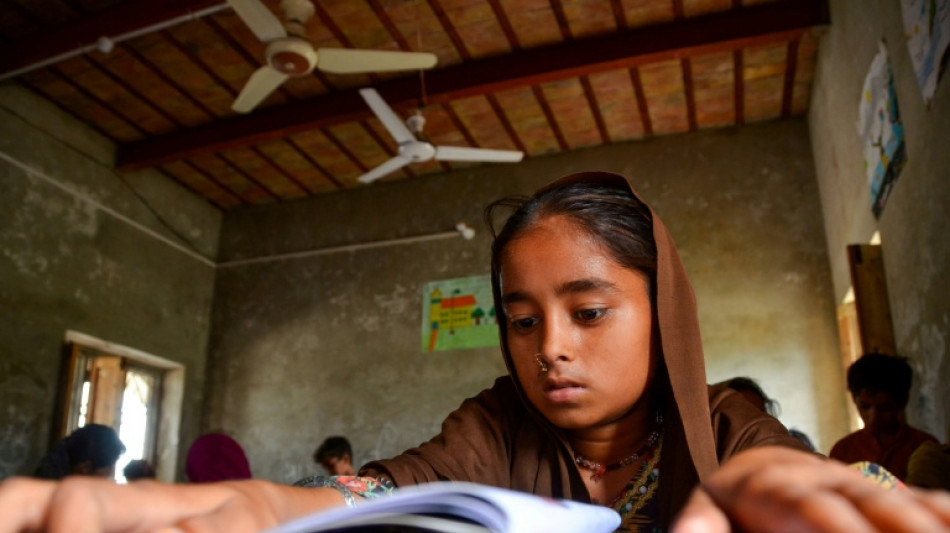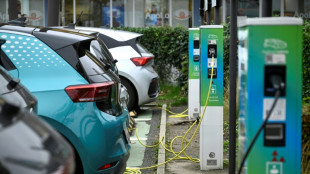
-
 Susan Sarandon to be honoured at Spain's top film awards
Susan Sarandon to be honoured at Spain's top film awards
-
Trump says 'time running out' as Iran rejects talks amid 'threats'

-
 Spain eyes full service on train tragedy line in 10 days
Spain eyes full service on train tragedy line in 10 days
-
Greenland dispute 'strategic wake-up call for all of Europe,' says Macron

-
 'Intimidation and coercion': Iran pressuring families of killed protesters
'Intimidation and coercion': Iran pressuring families of killed protesters
-
Europe urged to 'step up' on defence as Trump upends ties

-
 Sinner hails 'inspiration' Djokovic ahead of Australian Open blockbuster
Sinner hails 'inspiration' Djokovic ahead of Australian Open blockbuster
-
Dollar rebounds while gold climbs again before Fed update

-
 Aki a doubt for Ireland's Six Nations opener over disciplinary issue
Aki a doubt for Ireland's Six Nations opener over disciplinary issue
-
West Ham sign Fulham winger Traore

-
 Relentless Sinner sets up Australian Open blockbuster with Djokovic
Relentless Sinner sets up Australian Open blockbuster with Djokovic
-
Israel prepares to bury last Gaza hostage

-
 Iran rejects talks with US amid military 'threats'
Iran rejects talks with US amid military 'threats'
-
Heart attack ends iconic French prop Atonio's career

-
 SKorean chip giant SK hynix posts record operating profit for 2025
SKorean chip giant SK hynix posts record operating profit for 2025
-
Greenland's elite dogsled unit patrols desolate, icy Arctic

-
 Dutch tech giant ASML posts bumper profits, cuts jobs
Dutch tech giant ASML posts bumper profits, cuts jobs
-
Musetti rues 'really painful' retirement after schooling Djokovic

-
 Russian volcano puts on display in latest eruption
Russian volcano puts on display in latest eruption
-
Thailand uses contraceptive vaccine to limit wild elephant births

-
 Djokovic gets lucky to join Pegula, Rybakina in Melbourne semi-finals
Djokovic gets lucky to join Pegula, Rybakina in Melbourne semi-finals
-
Trump says to 'de-escalate' Minneapolis, as aide questions agents' 'protocol'

-
 'Extremely lucky' Djokovic into Melbourne semi-finals as Musetti retires
'Extremely lucky' Djokovic into Melbourne semi-finals as Musetti retires
-
'Animals in a zoo': Players back Gauff call for more privacy

-
 Starmer heads to China to defend 'pragmatic' partnership
Starmer heads to China to defend 'pragmatic' partnership
-
Uganda's Quidditch players with global dreams

-
 'Hard to survive': Kyiv's elderly shiver after Russian attacks on power and heat
'Hard to survive': Kyiv's elderly shiver after Russian attacks on power and heat
-
South Korea's ex-first lady jailed for 20 months for taking bribes

-
 Polish migrants return home to a changed country
Polish migrants return home to a changed country
-
Dutch tech giant ASML posts bumper profits, eyes bright AI future

-
 South Korea's ex-first lady jailed for 20 months for corruption
South Korea's ex-first lady jailed for 20 months for corruption
-
Minnesota congresswoman unbowed after attacked with liquid

-
 Backlash as Australia kills dingoes after backpacker death
Backlash as Australia kills dingoes after backpacker death
-
Brazil declares acai a national fruit to ward off 'biopiracy'

-
 Anisimova 'loses her mind' after Melbourne quarter-final exit
Anisimova 'loses her mind' after Melbourne quarter-final exit
-
Home hope Goggia on medal mission at Milan-Cortina Winter Olympics

-
 Omar attacked in Minneapolis after Trump vows to 'de-escalate'
Omar attacked in Minneapolis after Trump vows to 'de-escalate'
-
Pistons escape Nuggets rally, Thunder roll Pelicans

-
 Dominant Pegula sets up Australian Open semi-final against Rybakina
Dominant Pegula sets up Australian Open semi-final against Rybakina
-
'Animals in a zoo': Swiatek backs Gauff call for more privacy

-
 Japan PM's tax giveaway roils markets and worries voters
Japan PM's tax giveaway roils markets and worries voters
-
Amid Ukraine war fallout, fearful Chechen women seek escape route

-
 Rybakina surges into Melbourne semis as Djokovic takes centre stage
Rybakina surges into Melbourne semis as Djokovic takes centre stage
-
Dollar struggles to recover from losses after Trump comments

-
 Greenland blues to Delhi red carpet: EU finds solace in India
Greenland blues to Delhi red carpet: EU finds solace in India
-
Will the EU ban social media for children in 2026?

-
 Netherlands faces 'test case' climate verdict over Caribbean island
Netherlands faces 'test case' climate verdict over Caribbean island
-
Rybakina stuns Swiatek to reach Australian Open semi-finals

-
 US ouster of Maduro nightmare scenario for Kim: N. Korean ex-diplomat
US ouster of Maduro nightmare scenario for Kim: N. Korean ex-diplomat
-
Svitolina credits mental health break for reaching Melbourne semis


School's out: climate change keeps Pakistan students home
Pakistan's children are losing weeks of education each year to school closures caused by climate change-linked extreme weather, prompting calls for a radical rethink of learning schedules.
Searing heat, toxic smog and unusual cold snaps have all caused closures that are meant to spare children the health risks of learning in classrooms that are often overcrowded and lack basic cooling, heating or ventilation systems.
In May, a nationwide heatwave saw temperatures up to seven degrees Celsius above normal, hitting 45C (113 degrees Fahrenheit) in Punjab and prompting several provinces to cut school hours or start summer holidays early.
"The class becomes so hot that it feels like we are sitting in a brick kiln," said 17-year-old Hafiz Ehtesham outside an inner city Lahore school.
"I don't even want to come to school."
Pakistan is among the countries most vulnerable to climate change, with limited resources for adaptation, and extreme weather is compounding an existing education crisis caused mostly by access and poverty.
"Soon we will have major cognitive challenges because students are being impacted by extreme heat and extreme smog over long periods of time," said Lahore-based education activist Baela Raza Jamil.
"The poorest are most vulnerable. But climate change is indeed a great leveller and the urban middle class is also affected."
Pakistan's summers historically began in June, when temperatures hit the high 40s. But in the last five years, May has been similarly hot, according to the Meteorological Department.
"During a power outage, I was sweating so much that the drops were falling off my forehead onto my desk," 15-year-old Jannat, a student in Lahore, told AFP.
"A girl in my class had a nosebleed from the heat."
- Health versus learning -
Around a third of Pakistani school-age children -- over 26 million -- are out of school, according to government figures, one of the highest numbers in the world.
And 65 percent of children are unable to read age-appropriate material by age 10.
School closures affect almost every part of Pakistan, including the country's most populous province Punjab, which has the highest rates of school attendance.
Classes closed for two weeks in November over air pollution, and another week in May because of heat. In the previous academic year, three weeks were lost in January to a cold snap and two weeks in May due to heat.
Political unrest and cricket matches that closed roads meant more lost days.
In Balochistan, Pakistan's poorest province, May heatwaves have prompted early summer vacations for three years running, while in northwestern Khyber Pakhtunkhwa province, school hours are regularly slashed.
For authorities, the choice is often between sending children to school in potentially dangerous conditions or watching them fall behind.
In southern Sindh province, authorities have resisted heat-related closures despite growing demands from parents.
"It's hard for parents to send their children to school in this kind of weather," private school principal Sadiq Hussain told AFP in Karachi, adding that attendance drops by 25 percent in May.
"Their physical and mental health is being affected," added Dost Mohammad Danish, general secretary of All Sindh Private Schools and Colleges Association.
"Don't expect better scientists from Pakistan in the coming years."
- 'Everyone is suffering' -
Schools in Pakistan are overseen by provincial authorities, whose closure notices apply to all schools in a region, even when they are hundreds of kilometres (miles) apart and may be experiencing different conditions, or have different resources to cope.
Teachers, parents and education experts want a rethink of school hours, exam timetables and vacations, with schools able to offer Saturday classes or split the school day to avoid the midday heat.
Izza Farrakh, a senior education specialist at the World Bank, said climate change-related impacts are affecting attendance and learning outcomes.
"Schools need to have flexibility in determining their academic calendar. It shouldn't be centralised," she said, adding that end-of-year exams usually taken in May could be replaced by regular assessments throughout the year.
Adapting school buildings is also crucial.
International development agencies have already equipped thousands of schools with solar panels, but many more of the country's 250,000 schools need help.
Hundreds of climate-resilient schools funded by World Bank loans are being built in Sindh. They are elevated to withstand monsoon flooding, and fitted with solar panels for power and rooftop insulation to combat heat and cold.
But in Pakistan's most impoverished villages, where education is a route out of generational poverty, parents still face tough choices.
In rural Sukkur, the local school was among 27,000 damaged or destroyed by unprecedented 2022 floods. Children learn outside their half-collapsed school building, unprotected from the elements.
"Our children are worried, and we are deeply concerned," said parent Ali Gohar Gandhu, a daily wage labourer. "Everyone is suffering."
E.Gasser--VB



